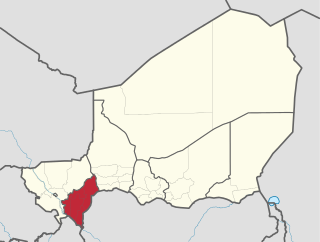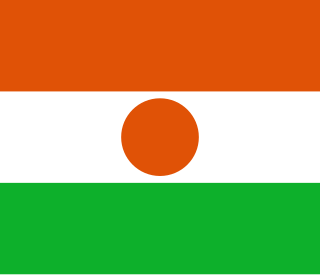Related Research Articles

Zarma is one of the Songhay languages. It is the leading indigenous language of the southwestern lobe of the West African nation of Niger, where the Niger River flows and the capital city, Niamey, is located. Zarma is the second-most common language in the country, after Hausa, which is spoken in south-central Niger. With over 6 million speakers, Zarma is easily the most widely spoken Songhay language.

The culture of Niger is marked by variation, evidence of the cultural crossroads which French colonialism formed into a unified state from the beginning of the 20th century. What is now Niger was created from four distinct cultural areas in the pre-colonial era: the Djerma dominated Niger River valley in the southwest; the northern periphery of Hausaland, made mostly of those states which had resisted the Sokoto Caliphate, and ranged along the long southern border with Nigeria; the Lake Chad basin and Kaouar in the far east, populated by Kanuri farmers and Toubou pastoralists who had once been part of the Kanem-Bornu Empire; and the Tuareg nomads of the Aïr Mountains and Saharan desert in the vast north. Each of these communities, along with smaller ethnic groups like the pastoral Wodaabe Fula, brought their own cultural traditions to the new state of Niger.

The Songhai people are an ethnolinguistic group in West Africa who speak the various Songhai languages. Their history and lingua franca is linked to the Songhai Empire which dominated the western Sahel in the 15th and 16th century. Predominantly adherents of Islam, the Songhai are primarily located in Niger and Mali. Historically, the term "Songhai" did not denote an ethnic or linguistic identity but referred to the ruling caste of the Songhay Empire known as the Songhaiborai. However, the correct term used to refer to this group of people collectively by the natives is "Ayneha". Although some speakers in Mali have also adopted the name Songhay as an ethnic designation, other Songhay-speaking groups identify themselves by other ethnic terms such as Zarma or Isawaghen. The dialect of Koyraboro Senni spoken in Gao is unintelligible to speakers of the Zarma dialect of Niger, according to at least one report. The Songhay languages are commonly taken to be Nilo-Saharan but this classification remains controversial: Dimmendaal (2008) believes that for now it is best considered an independent language family.

Dosso is a city in the south-west corner of Niger. It lies 130–140 kilometres (81–87 mi) south-east of the capital Niamey at the junction of the main routes to Zinder and Benin. The eighth-most populous town in Niger and the largest in Dosso Region, it had an official population during the 2001 census of 43,561. The population grew to 58,671 in the 2012 census. It is the capital of its region - which covers five departments in the southwestern corner of the nation - as well as of its own department, Dosso Department. The city itself lies at the centre of its own Urban Commune.

Dosso is one of the eight Regions of Niger. The region has an area of 31,002 square kilometres (11,970 sq mi), with a population of 2,754,500 as of 2020.

The National Movement for the Society of Development, also known as the National Movement for the Development of Society is a political party in Niger. Founded under the military government of the 1974–1990 period, it was the ruling party of Niger from 1989 to 1993 and again from 1999 until 2010, when a coup on 18 February 2010, by a military junta called the Supreme Council for the Restoration of Democracy (CSRD), ousted President Mamadou Tandja.

The Nigerien Alliance for Democracy and Progress is a political party in Niger. Moumouni Adamou Djermakoye led the party from its foundation in 1992 until his death in 2009.

Islam in Niger accounts for the vast majority of the nation's religious adherents. The faith is practiced by more than 99.3% of the population, although this figure varies by source and percentage of the population who are classified as Animist. The vast majority of Muslims in Niger are Malikite Sunni. Many of the communities who continue to practice elements of traditional religions do so within a framework of syncretic Islamic belief, making agreed statistics difficult. Islam in Niger, although dating back more than a millennium, gained dominance over traditional religions only in the 19th and early 20th centuries, and has been marked by influences from neighboring societies. Sufi brotherhoods have become the dominant Muslim organization, like much of West Africa. Despite this, a variety of interpretations of Islam coexist—largely in peace—with one another as well as with minorities of other faiths. The government of Niger is secular in law while recognising the importance of Islam to the vast majority of its citizens.

The Zarma people are an ethnic group predominantly found in westernmost Niger. They are also found in significant numbers in the adjacent areas of Nigeria and Benin, along with smaller numbers in Burkina Faso, Ivory Coast, Ghana, Togo, and Sudan. In Niger, the Zarma are often considered by outsiders to be of the same ethnicity as the neighboring Songhaiborai, although the two groups claim differences, having different histories and speaking different dialects. They are sometimes lumped together as the Zarma-Songhay or Songhay-Zarma.
Moumouni Adamou Djermakoye was a Nigerien politician and the President of the Nigerien Alliance for Democracy and Progress. He was an important minister during the regime of Seyni Kountché and subsequently served as Niger's Ambassador to the United States from 1988 to 1991; later, after founding the ANDP, he served as President of the National Assembly of Niger from 1993 to 1994. He was the ANDP's candidate in four presidential elections, beginning in 1993; he was also a deputy in the National Assembly from 1999 to 2009 and the President of the High Court of Justice from 2005 to 2009.

The following outline is provided as an overview of and topical guide to Niger:
The Dosso Kingdom is a precolonial state in what is now southwest Niger which has survived in a ceremonial role to the modern day.

The Union of Popular Forces for Democracy and Progress–Sawaba is a political party in Niger, founded as the Nigerien Democratic Union in 1954. The original party, founded by Nigerien Progressive Party (PPN) co-leader Djibo Bakary when he was expelled from the PPN. In the mid-1950s it created a broad coalition led by urban leftists but forged of conservative rural notables, especially from Hausa areas, which dominated the nascent Nigerien independence movement. In this period it was renamed Mouvement Socialiste Africain–Sawaba, and then simply Sawaba. In pushing for complete independence from France in a 1958 referendum, the party fractured. At independence in 1960 it found itself in opposition and outlawed by Niger's first president, Hamani Diori. From exile, the party attempted an abortive guerrilla campaign in the mid-1960s, and then largely disappeared. Its leadership returned to Niger following the 1974 military coup, but soon found themselves arrested, in exile, or marginalised. Following the return of democracy in 1991, the now elderly Bakary re-founded the party as UDFP–Sawaba. In the 1993 elections it took only a small numbers of votes. Within the year, the party had split, with a new faction (UDFR–Sawaba) joining the government coalition. Despite Bakary's death in 1998 and their continued electoral underachievement, both parties holding the Sawaba name continue.

The Dallol Bosso is one of two major seasonal river valleys in southwest Niger. The Dallol Bosso valley runs from the Azawagh area in the Sahara west and south through the Dosso Region where it reaches the Niger River valley.

The Alliance of the Forces of Change was one of the two large political coalitions which contested for power in Niger from 1991 to 1996.
The 1974 Nigerien coup d'état was a largely bloodless military insurrection which overthrew the first postcolonial government of Niger. The government that followed, while plagued by coup attempts of its own, survived until 1991.
The Kurtey people are a small ethnic group found along the Niger River valley in parts of the West African nations of Niger, Benin, Mali, and Nigeria. They are also found in considerable numbers in Ghana, Togo, Ivory Coast, and Burkina Faso.

Liboré is a rural commune (municipality) in the Kollo Department, Tillabéri Region, in Niger. As of 2012, it had a population of 26,243.
Fatimata Gandigui Mariko, better known as Fati Mariko, is a Nigerien singer.
References
- James Decalo. Historical Dictionary of Niger. Scarecrow Press/ Metuchen. NJ - London (1979) ISBN 0-8108-1229-0 p. 93, 203